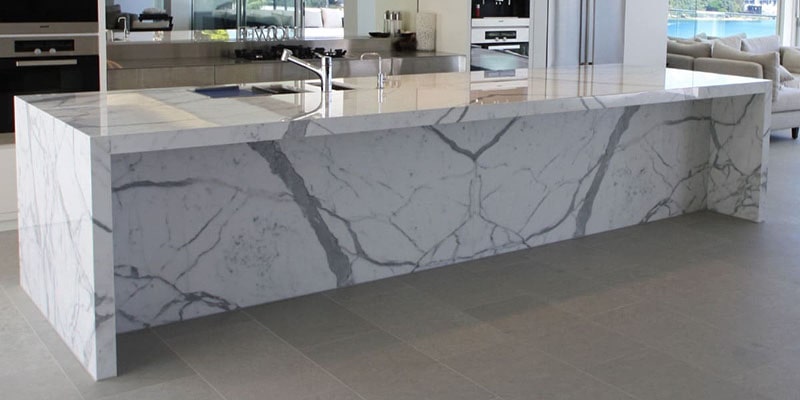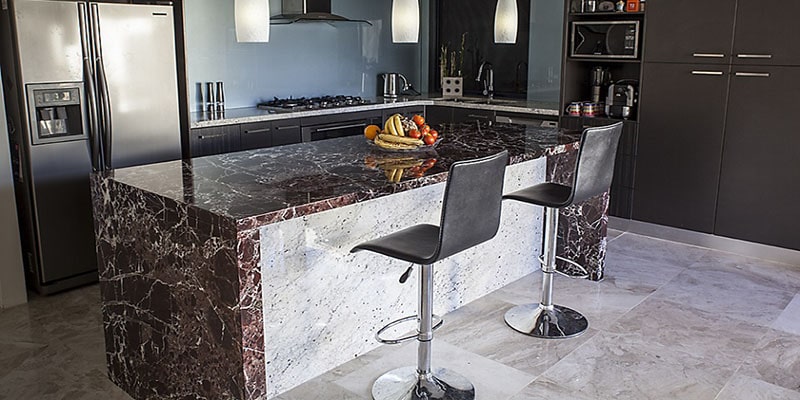Porcelain benchtops are becoming increasingly popular choices for Perth homeowners. Hard-wearing and with low porosity, porcelain is becoming a common alternative to granite for people who want a tough benchtop.
In this post, we take a detailed look at the pros and cons of both options:
Porcelain Benchtops – Pros and Cons
Porcelain is a ceramic made from powdered clay and pigments bonded together at high temperature and pressure. You’ll probably be more used to seeing porcelain in bathrooms, but it has many properties that make it an excellent choice for a benchtop. It’s advantages include:
- Hard and Strong – Porcelain is extremely hard and is resistant to both scratches and abrasion. It is 30% stronger than granite making it the strongest material commonly used in benchtops.
- Low Porosity – Porcelain is almost impermeable; it strongly resists absorbing liquids and so is unlikely to be stained by spilled liquids.
- Heat and Fire Resistant – It’s fine to put hot pans down on a porcelain benchtop; the heat will not cause it to discolour.
- High UV Resistance – Porcelain will not fade even when exposed to direct sunlight on a regular basis, it can even be installed outdoors.
- Wide Range of Finishes – Porcelain can be created with both matt and polished finishes. Additionally, porcelain can be printed with designs that make it look like any many other materials, including limestone, marble, and wood.
- Recyclable – Porcelain can be recycled; often it is turned into aggregate for paving or insulation.
Porcelain’s drawbacks include:
- Brittle – Given a significantly heavy impact, porcelain will chip or crack rather than dent. It can be repaired, but the repair is likely to be visible.
- Skin-Deep Designs – Porcelain can be printed with designs to mimic other materials, but these designs are only on the surface. The plain porcelain will show if grooves are cut in it (for drainage) and at joins between pieces.
- New Stone – Porcelain is only now becoming popular for benchtops, and some stonemasons may not have experience using it.
Granite Benchtops – Pros and Cons
Granite is a natural stone and a very popular choice for benchtops. Its advantages include:
- Hard and Strong – Granite is hard and strong, but not quite as strong as porcelain. Despite this, it is still highly unlikely to sustain damage during normal usage as a benchtop.
- Heat and Fire Resistant – Like porcelain, granite resists heat and shouldn’t discolour when a hot pan is placed on it.
- Low Porosity When Sealed – Granite should resist absorbing liquids once it has been sealed.
- Wide Range of Finishes – Granite comes in many different shades and patterns, although these are limited to naturally occurring colours.
Granite has a few drawbacks:
- Regular Sealing – Granite is naturally porous and will need to be sealed to resist staining.
- Brittle – Like porcelain, granite will crack if hit hard enough. This is unlikely to occur under normal use.
- Less UV Resistance – Some granites can fade in bright sunlight; however, this is unlikely to happen in your home: modern windows block enough UV that this should not be a problem.
Conclusion: Granite or Porcelain?
Both granite and porcelain are good options. They’re both strong, heat and scratch resistant, unaffected by harsh chemicals, and easy to clean. Both are also heavy stones and hard to cut, so both are likely to have higher labour charges than some other materials. And although porcelain is stronger than granite, you shouldn’t worry about either getting damaged under normal use.
Porcelain has a slight edge for two reasons. Firstly, porcelain is typically cheaper than granite, all other things being equal. Now that porcelain is becoming more readily available, this is likely to be a deciding factor for many people.
Secondly, porcelain has a wider range of designs as it can have finishes printed on to it. This makes it a great alternative to limestones and marbles because it can mimic their look but doesn’t have any of their weaknesses. Granite is limited to its naturally-occurring colours.
Made your choice or still undecided? Either way, the experts at Medici Marble & Granite can help. Contact our team today for advice or for a free quote.


